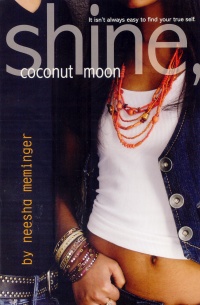| ________________
CM . . . . Volume XIX Number 15 . . . . December 14, 2012
excerpt:
The day 17-year-old Samar opens the front door of her suburban New Jersey home, she opens herself up to a new world. The man standing on the front step is Uncle Sandeep, her mother's long estranged brother. It is four days after the 9/11 terrorist attacks, and he has come to attempt a reconciliation with his sister, Sharan. He tells her, "We're living in different times now, Sharan, and I want to be close to the ones I love." Sandeep's declaration stirs Samar's longing to understand her mysterious personal history, a history her mother has kept carefully concealed from her. Uncle Sandeep's arrival marks a pivotal moment for Samar. His exotic dark looks, his turban, and his gentle, teasing manner intrigue Samar. But opening a door is one thing; walking through it is an entirely different matter. Shine, Coconut Moon is the engaging, complex story of a young Sikh girl's struggle to reclaim her heritage in the wake of the 9/11 terrorist attacks. Where Samar's home life is quiet and lonely, her best friend, Molly, is loud and brimming over with family. Samar feels more alone than ever when she is "in the midst of all that laughter and familyness". But Uncle Sandeep holds open the opportunity to be a part of her own family, the family Samar's mother is adamant they will have nothing to do with. She tells Samar that the two of them alone together "are a perfectly valid family unit". This conflict between mother and daughter – Sharan hinting darkly about her strict, judgmental parents while Samar begs to be allowed to make her own decisions about the grandparents she doesn't know - steers most of the complex plot. But it is just one of the many issues stirred by the sudden arrival of Uncle Sandeep. Samar finds herself re-evaluating many of her relationships and understandings about herself and others. One relationship that cannot bear the strain of Samar's self-questioning is her relationship with her boyfriend. Like so many Americans, Mike seems to have generalized his anger at the 9/11 terrorists to include everyone who looks like "them". It comes as no surprise when Samar breaks up with Mike, but his anger ramps up the tension and actually facilitates even deeper questioning on Samar's part. Samar finds herself wondering about her integration into this white middle class world. She realizes that, while Molly's friendship has protected her from racial taunting, it has also prevented her from exploring relationships with other Indian kids. While Uncle Sandeep helps Samar answer some of her questions about her family and Sikh culture, Samar is guided by new friends in her investigation of her identity. Like the plot, Samar, herself, is an interesting and complex character. The first person narration allows readers to see both the emotional turmoil of these events, as well as her intellectual evaluation of them. Her relationship with her mother is multidimensional, and readers see and feel right along with Samar the impact of the choices her mother has made. The supporting cast is also satisfyingly well-rounded. More than just a curly-headed side-kick, Molly is a genuinely good friend who both challenges and supports Samar. Uncle Sandeep is warm and loving, but he also makes mistakes as he attempts to draw his sister and niece back into the family. Only Sharan, Samar's mother, strains credibility. Although the reasons Sharan has cut ties with her family are entirely legitimate, it is hard not to feel sceptical that this well-educated, self-actualized, strong woman would not have found some way back to her family, at least for the sake of her daughter. Despite some moments of clunky dialogue and awkward exposition - for example Samar and Molly's lingerie discussion seems forced and feels uncomfortable instead of light and entertaining - Shine, Coconut Moon is a very enjoyable book. It explores issues of racism, identity and family from many points of view, giving fair treatment to a wide variety of perspectives. All of this is done at a very accessible reading level making this novel most appropriate for girls in grade 8 through 10. Recommended. Charlotte Duggan is a teacher-librarian in Winnipeg, MB.
To comment
on this title or this review, send mail to cm@umanitoba.ca.
Copyright © the Manitoba Library Association. Reproduction for personal
use is permitted only if this copyright notice is maintained. Any
other reproduction is prohibited without permission.
NEXT REVIEW |
TABLE OF CONTENTS FOR THIS ISSUE
- December 14, 2012.
AUTHORS |
TITLES |
MEDIA REVIEWS |
PROFILES |
BACK ISSUES |
SEARCH |
CMARCHIVE |
HOME |
